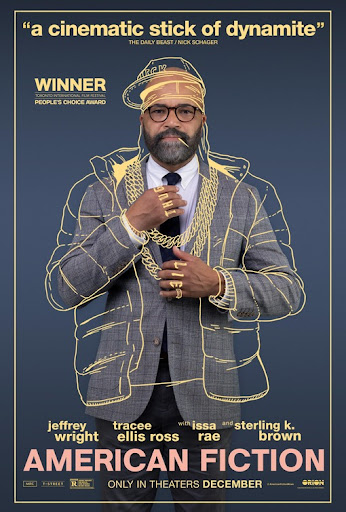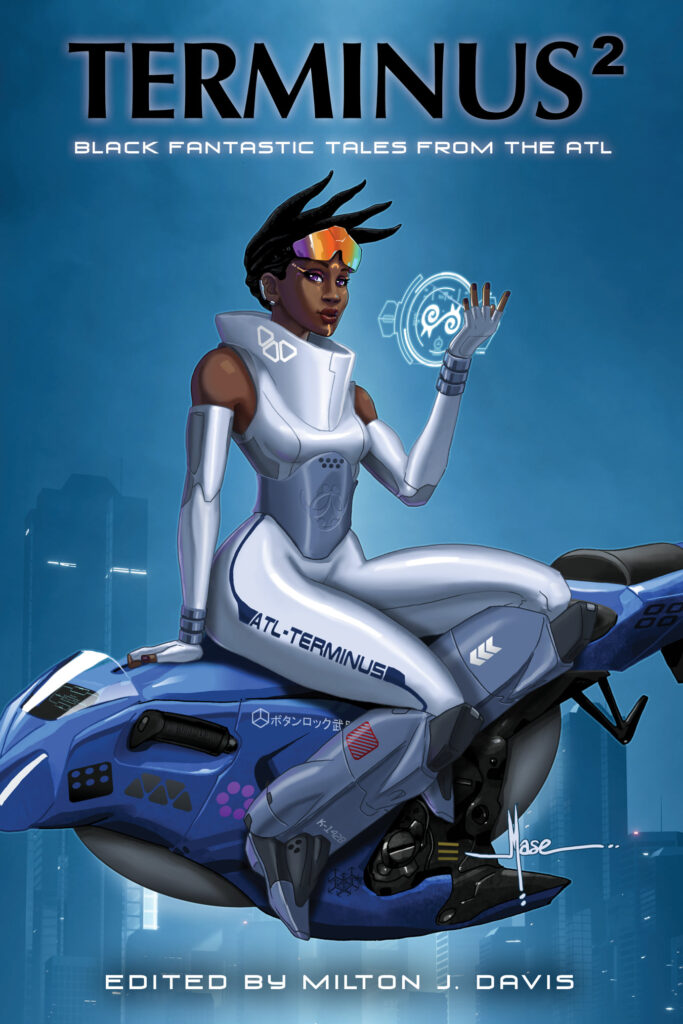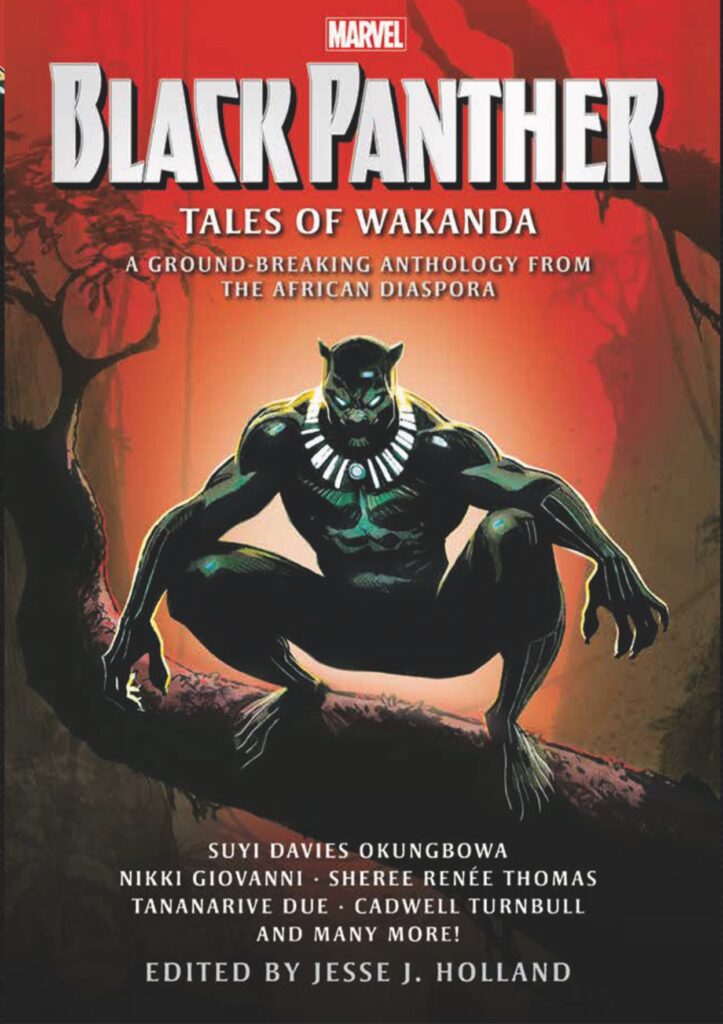“The flame might be gone, but the fire remains
And I’m stuck on a path to my own ruin
Did you see me behind the wheel?
Did you see me behind the wheel?
And the flame might be gone, but the fire…
-“Remembered” by The Dear Hunter
Sometime in the middle of last year, I heard the premise for American Fiction (2023) and thought it sounded like an absolutely genius concept completely relevant to not just my experiences as an author, but the experiences of a whole bunch of POC that I personally know. Lo and behold, upon viewing it, they knock most of it out of the park (I don’t like the final act, personally; I think it doesn’t feel cohesive and satisfying enough to end what was a REALLY good story in the first and second acts). Enough that it’s why I felt like I wanted to blow the dust off my blog for an entry. I think this movie is going to give us a lot of cud to chew as a society, and that it’s definitely a conversation worth having among black authors in particular.
Let’s get into it. Before we start, spoilers for American Fiction (2023). At the time of this post, it is still in theaters so if you want to get the juicy details, I recommend you pop out to a theater. Its theatrical run was extended thanks to the Oscar nominations.
American Fiction is about a struggling black professor named Thelonious “Monk” Ellis who is vexed by the fact that his work is actually quite good, but it doesn’t sell because it’s complex and not palatable to the masses. After a lot of misfortune, he gets the idea to write a book that’s both pandering to urban fiction readers and is a middle finger to the industry that puts out books that basically (in his opinion) reinforce harmful black stereotypes and sends it to his publisher under a different pseudonym, laughing that he will get reviled reactions to writing tripe. Well, the opposite happens! Immediately, a huge publisher says they want the book and to offer him friggin’ $750,000 for it. Monk is gobsmacked, but since his sister just died and his mother was just diagnosed with early onset Alzheimer’s, he reluctantly decides to take the offer. Things get even more complicated when the book blows up as a number one bestseller and he gets a movie deal, despite his chagrin and embarrassment, and he struggles to reconcile the fact that the worst thing he’s ever written is now his most successful book.
So, in my family, my older brother and have a running joke about the fact that I am a fairly good writer (or at least I feel that I might be one; none of the good writers ever know it or believe it even when given evidence) but I make nothing off my books because I don’t write to market, and if I just sold out and wrote bad smut or books for basic bitches, I’d be a millionaire.
You can see why I went right out to see this film as a result.
American Fiction’s biting sarcasm and relentless exposure of the faults in the publishing world and the black community is definitely going to be remembered by all relevant parties. This film shines a light on something that the average person, regardless of race, ethnicity, and nationality, probably doesn’t know. Way too many people don’t know how the writing and publishing world works, and this film does. It truly gets it. It gets what black writers go through and it gets what the mainstream publishing world sounds like. Whoever wrote it definitely has either experienced this crap directly or is intimate with someone who does, because everything in the film proceeds exactly how it does in real life, for the most part.
And that’s what got me thinking.
If I had to sum up American Fiction (2023) in a word, I’d say it’s about responsibility.
So in the story, one of the reasons Monk decides to write the most base and pandering piece of crap novel is after having to endure watching a book seemingly just like it blow up by a black female author named Sindra. It inadvertently puts him on edge every time he has to be somewhere and see her book, given that the book just panders to every black stereotype since that is the genre expectation for urban fiction. Finally, in the third act, he and the author are in the same room and he asks her why she considered his book (keep in mind, she has no idea he wrote it) pandering, yet hers doesn’t count. She fires back that she’s writing to market and that it’s not her fault if white people or other people think that all black people behave the way they do in urban fiction. The film is basically examining personal responsibility as an author and in particular, as a black author.
And I can say for certain that is going to ring through the halls of history as relevant for decades to come.
The film has a very intelligent argument and I appreciate the living hell out of it being in a big production movie that is now an Oscar nominee. Now, don’t get me wrong—fuck the Oscars. Yeah, I said it. They’re archaic, antiquated, and utter crock. Most of the time, if a good movie gets an Oscar nom, it’s a fucking coincidence. The Academy in no way is interested in awarding the “best” movie anything; this is a room full of people that wanna be pandered to, and the harder you pander, the more they’ll pat you on the back, which is why damn near every year is the same fucking movies getting nominated. It’s aggravating as hell and it’s why they are continuously losing the public’s attention. People are tired of unknown garbage getting attention, especially since the Academy is who’s being lambasted by the very same film they nominated. The Academy doesn’t want to hear shit from POC unless it’s a story about their pain. Every once in a blue moon, you’ll get competent and joyful films winning like Everything Everywhere All at Once, but largely if POC are nominated, especially black people, it’s because it’s talking about our pain, not our triumph, and the Academy seems to think the only relevant stories we can tell are about our pain, which is exactly what is discussed in this film, and it’s handled rather well.
But I do take a departure from Sindra’s argument.
Sindra’s argument boils down to “people enjoy what I write and I’m not wrong to write to that market; it’s the responsibility of white people to not believe nothing but stereotypes.” That’s a good, solid argument…but I disagree. I understand the argument completely and I think I agree to an extent, but my problem with what’s discussed in the film is more of a long term, wider scale problem than an isolated one.
The reason that I dislike that type of writing is that it reinforces negative stereotypes about black people that affects things outside of just the reading world. What I’m concerned about is the long term effects of writing that kind of fiction. Sindra is correct; it is the responsibility of society to not reinforce negative stereotypes, but I argue that authors hold some of that responsibility too. It is for this very reason that you see a lot of popular white authors either never writing black people (even if the character LIVES IN THE MIDDLE OF FUCKING CHICAGO NOT POINTING FINGERS OR ANYTHING BUT YOU KNOW WHO THE FUCK YOU ARE) out of fear that they’ll “get something wrong” and offend POC or they seldom write them and cheat readers out of what could be an interesting character and story. If these white authors don’t have POC in their lives, first of all, that’s sad and they need to get their shit together, but second of all, they feel like they’re too scared to write POC because all they’ve ever seen are Tyler Perry movies and Worldstar and Eric Jerome Dickey books, so they have zero frame of reference for the black experience, so they skip it. While that’s an isolated problem, it’s much bigger than that. The problem I have with Sindra’s argument is that when you endorse this type of writing, there are real life consequences.
I’ll give you an example. Let’s say there is a job opening for a front desk clerk at a dentist’s office. The hiring manager has two candidates that are the same age, have the same level of education, and have the same level of experience needed for the job. Both of them have great interviews, too. One is black and the other is white. For the sake of the argument, let’s say this hiring manager is white. Now, here he sits with two resumes of identical people. How does he make that decision? Well, if this hiring manager has seen nothing but Tyler Perry movies and reality TV shows, what are the chances he starts thinking about his black potential candidate as being a problem? More than likely, it’s gonna creep into his head and influence the decision, so he passes on the black candidate based on falsified evidence of what black people are like. That’s my problem with Sindra’s argument. This is of course a small situation and I’m sure that black candidate doesn’t want to work for someone who would turn him down based on him believing an incorrect stereotype, but that’s my point.
Opportunities can be taken away from black creatives based on negative stereotypes. And that isn’t just black people, too—people of color in general have to struggle with the fact that the white population is still in control of most of America’s working parts, and so we have to contend with extra stress and problems that they don’t necessarily have based on race. This is of course not to say white people don’t have problems; of course they do, they have the same problems except for the fact that when white people act out, no one blames the entire race. And that’s what black people—and POC in general—have to contend with on a daily basis. I cannot tell you how many micro-aggressions I’ve had to endure being a black woman in the South. It’s truly maddening how differently you’re treated as a black woman in America, but the South really can get under your skin and make you frustrated with how they handle everything down here. Sindra’s argument, to me, is too idealistic. I would love to live in a world where stereotypical behavior is not viewed as blamed on an entire race of people.
But that’s not the world we live in.
Someone once said that being a woman is like ballroom dancing backwards in high heels, and it is. But I would argue being black is very similar. We can’t just be as good as our white counterparts—we have to be better in every way, and even when we are better (though to be fair, better is a very subjective term for this argument), there is still an enormous possibility that we get nowhere because the person at the gate is someone who looks at us and sees nothing but negative stereotypes. We have to work ten times harder for the same reward that would’ve been considered on normal merit had we not been a POC. That’s why I don’t agree that there is no responsibility with us as black writers. I think we have to pay attention to what we’re putting out there because even if it seems like no one cares and no one’s watching, someone certainly is and they can unknowingly affect the outcome of a black person’s life based on their experiences. I’d love to say that we can get there as a society, but I’m not confident in our ability to understand complexities.
But that’s also what I like about the film. It is a complicated argument with plenty of support for both sides and I love that someone wanted to have this conversation at all. This is exactly what all low-to-mid-level black authors go through at some point, especially the indie and small press crowd. I certainly don’t feel negatively towards urban fiction; who the hell am I to judge? If y’all saw my Browser History on AO3, you’d have plenty of stones to throw into my little glass house. But what I am saying is that I think it’s still our responsibility as black authors to think before we write something that might have a Domino effect down the line, but we also need to call out the people who make shitty decisions based on stereotypes at all times. We can’t let up on that. It’s ridiculous to sum up a whole race of people based on a 90 minute movie or a season of a reality show. We shouldn’t do it to each other and we shouldn’t do it to other races, nationalities, and ethnicities. Hell, that’s how we’ve had a resurgence of fucking Nazis in America; instead of punching them in the face, people said “we should hear them out” and now we’ve got a whole ass third of the country insane enough to storm the fucking Capitol to assassinate the Speaker of the House and the goddamn former Vice President. This. Stuff. Matters.
And yes, I know that’s a huge example for such a modest film, but that’s why I feel so strongly about the argument the movie presents. It’s surprisingly the small stuff that can make a difference in the writing world. I also think that every writer, no matter how successful, should be fostering friendships and relationships to help each other out. We are not in competition. All of us should reach down and pull the person below us on the ladder up, not pull the ladder up behind us so they can’t reach out of fear. We have to uplift if we want things to change. We have to keep having these conversations to eradicate as much of that learned hatred as possible.
And I really think films like American Fiction (2023) are how we get closer to that goal.
So thank you to everyone who had anything to do with making it. Even though I didn’t feel the ending was right, I really had a good time with the first and second acts and I hope they get to bring home the (irrelevant) gold just because it would be good for America to find out just how fucking rough it is out here for black authors.
But we persevere.
Here’s to you, American Fiction. Knock those old bastards at the Academy dead when it comes time.
Kyoko



